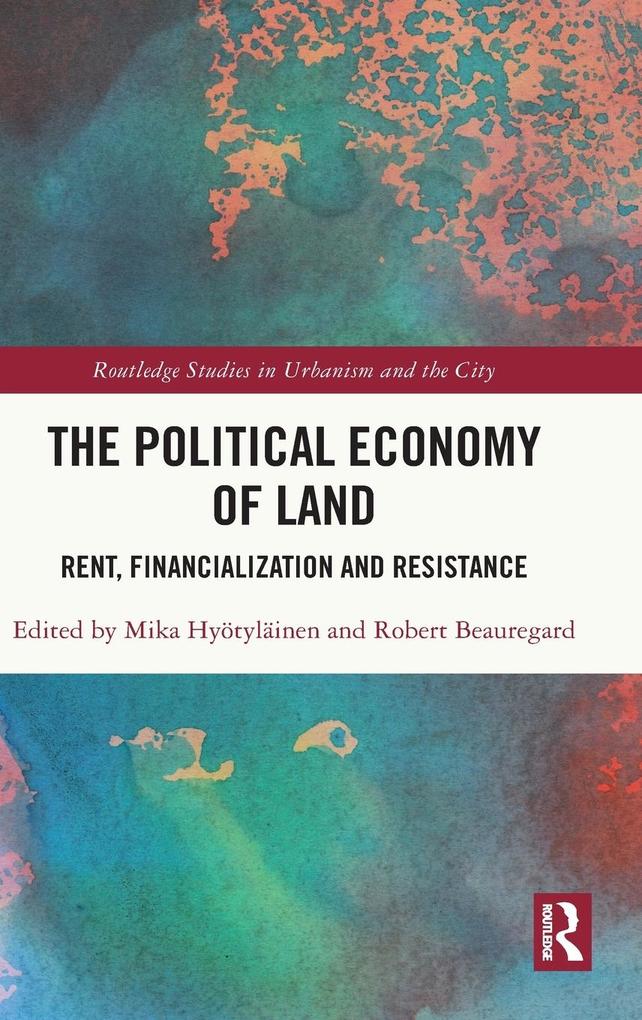
Zustellung: Mi, 16.07. - Sa, 19.07.
Versand in 7 Tagen
VersandkostenfreiBestellen & in Filiale abholen:
This volume brings together a collection of original investigations of the current thinking on three broad themes: the assetization of land and buildings, the relationship of land rent to valuation and speculation in the markets for private and public properties, and the different ways in which land functions as a social relation.
Inhaltsverzeichnis
Introduction: The Political Economy of Land
Part I: The Assetization of Land and Buildings
1. Land as a Financial Asset: The Theory of Urban Rent as a Mirror of Economic Transformation
2. Land as an Asset
3. Buildings as Financial Assets
Part II: Rent, Real Estate, and Property Markets
4. The Risk Myth: Blackstone, Housing and Rentier Capitalism
5. The Political Economy of Abandoned Property: Structure and Agency in Land Banking Practice in Muncie, Indiana
6. The Political Economy of Italian Public Real Estate Privatization: Austerity, Financialization and the "Enrichment Economy"
7. The Singapore and Hong Kong Property Markets: Lessons for the West from Successful Global Cities
Part III: Land and Social Relations
8. Land Relations in Turmoil: Trans-Local Constructions of Home Among Rural Migrants to Xiamen, China
9. Bridging Between Owners and Users in Japan's Private Property Regime: The Case of Farmland Banking
10. Unauthorized Neighborhoods, Land Rent, and Working-Class Struggles in Indian Cities: The Slum Question Revisited
11. Public Land as a Social Relation: The Case of East River Park in New York City
12. Land Rent and the Struggle for the Urban Commons in Helsinki's Suvilahti DIY Skatepark
Conclusion: A Summary from the Perspective of Rent Theory
Part I: The Assetization of Land and Buildings
1. Land as a Financial Asset: The Theory of Urban Rent as a Mirror of Economic Transformation
2. Land as an Asset
3. Buildings as Financial Assets
Part II: Rent, Real Estate, and Property Markets
4. The Risk Myth: Blackstone, Housing and Rentier Capitalism
5. The Political Economy of Abandoned Property: Structure and Agency in Land Banking Practice in Muncie, Indiana
6. The Political Economy of Italian Public Real Estate Privatization: Austerity, Financialization and the "Enrichment Economy"
7. The Singapore and Hong Kong Property Markets: Lessons for the West from Successful Global Cities
Part III: Land and Social Relations
8. Land Relations in Turmoil: Trans-Local Constructions of Home Among Rural Migrants to Xiamen, China
9. Bridging Between Owners and Users in Japan's Private Property Regime: The Case of Farmland Banking
10. Unauthorized Neighborhoods, Land Rent, and Working-Class Struggles in Indian Cities: The Slum Question Revisited
11. Public Land as a Social Relation: The Case of East River Park in New York City
12. Land Rent and the Struggle for the Urban Commons in Helsinki's Suvilahti DIY Skatepark
Conclusion: A Summary from the Perspective of Rent Theory
Produktdetails
Erscheinungsdatum
30. November 2022
Sprache
englisch
Seitenanzahl
266
Herausgegeben von
Mika Hyötyläinen, Robert Beauregard
Verlag/Hersteller
Produktart
gebunden
Gewicht
567 g
Größe (L/B/H)
240/161/19 mm
ISBN
9781032248196
Entdecken Sie mehr
Bewertungen
0 Bewertungen
Es wurden noch keine Bewertungen abgegeben. Schreiben Sie die erste Bewertung zu "The Political Economy of Land" und helfen Sie damit anderen bei der Kaufentscheidung.









